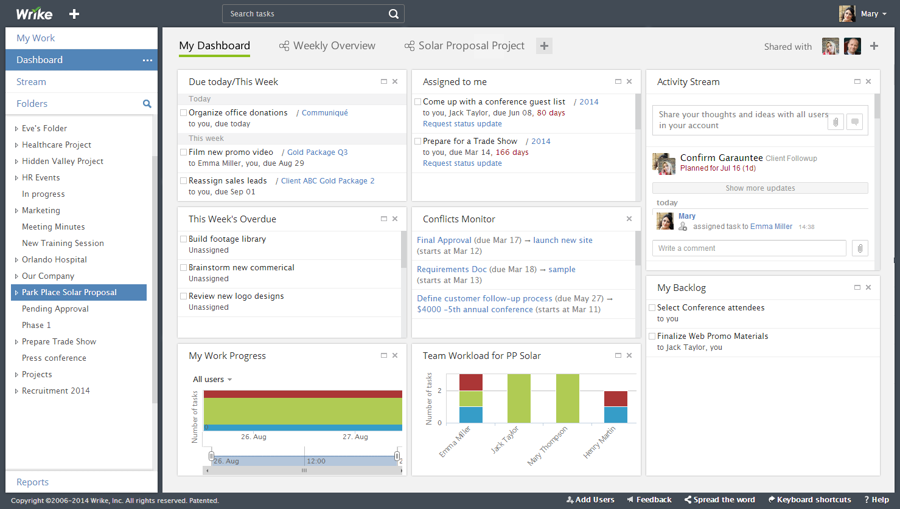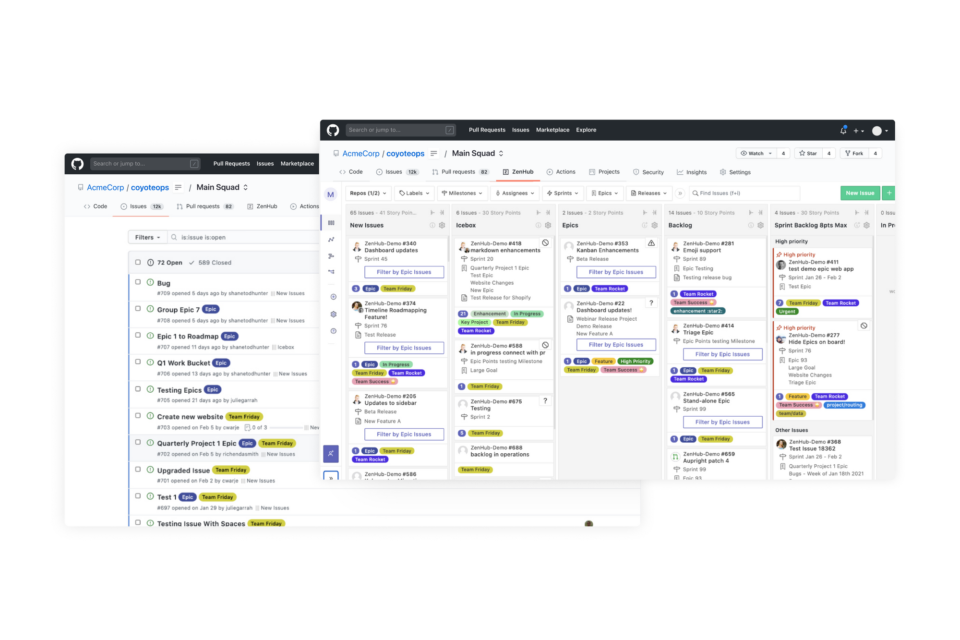Zenhub and Wrike are two popular tools software developers use to collaborate, increase productivity, and manage projects. While both have several features that could fulfill your development team’s needs, which is the better PM software: Zenhub or Wrike? We will help answer that question by dissecting both tools in terms of their features, pricing, pros and cons, and their differences.
Zenhub Features for Software Developers
zenhub is a favorite of many software development teams because it lets them not only manage their projects, but also has direct integration with GitHub. In fact, Zenhub’s creators designed the software specifically for teams using GitHub to overcome one of the biggest obstacles to developer productivity: Context switching. Thanks to a browser extension that injects Zenhub’s interface into GitHub, developers can stick with their code, avoid switching to a third-party PM app, reduce distraction, and improve productivity.
Besides fusing code with project management, here are some other features that showcase what Zenhub can do:
- Customized workspaces and team-specific workflows
- Project tracking via Kanban boards that let you attach pull requests, prioritize tasks, etc., with user-friendly drag-and-drop functionality
- Automations to save time with repetitive tasks
- Velocity and burndown charts
- Automated sprint planning
- Reports using data pulled from GitHub, such as release reports, control point charts, cumulative flow diagrams, etc.)
- Integration with Slack for collaboration
How Much Does Zenhub Cost?
Zenhub offers three pricing plans to fit varying development team needs and budgets:
- Free: Unlimited workspaces and all of Zenhub’s features for open-source teams and beginners
- Growth: Unlimited private repositories and all of Zenhub’s features for $8.33 per user, per month with annual billing (free trial available)
- Enterprise: All of Zenhub’s features, a dedicated customer success manager, and on-premise or cloud hosting priced according to your team’s specific size and needs
While it is not unusual for PM software to have a free plan, Zenhub separates itself from competitors by giving project managers and developers all its features in the complimentary offering.
Zenhub Pros and Cons
What are the biggest reasons to choose Zenhub for managing your development team’s projects, and what are some reasons to avoid it? Have a look at these Zenhub pros and cons:
Zenhub Pros for Developers:
- Access to all of Zenhub’s features through its Free plan
- Direct integration with GitHub tackles the problem of context switching and makes it almost a no-brainer for GitHub users
- Customized dashboards and workflows are ideal for teams with unique needs seeking customization
Zenhub Cons for Developers:
- Larger teams using bigger boards with massive amounts of data may experience lethargic performance that can negatively impact productivity or produce frustration
- Support can be sluggish for users of non-Enterprise plans
You can learn more by reading our Zenhub Project Management Software Review.
Wrike Project Management features

wrike is another popular PM tool used by software development teams. Unlike Zenhub, however, it was not created with developers (or, more specifically, GitHub users) in mind. Instead, Wrike was created to help professional service providers (like marketing agencies) manage their projects. What features does Wrike have that could serve your development team’s needs? Here are some of its highlights:
- Specialized templates for product development, IT, research, sales, etc.
- Team collaboration through proofing, document editing, cross-tagging, internal and guest approvals, file attachments, real-time comments, and external requester collaboration
- Three-pane dashboard that offers instant access to your entire workflow
- Real-time analytics with dashboards, charts, reports, and infographics that update every 15 minutes
- Custom shape builder
- Automated workflows
- Integration with over 400 tools
How Much Does Wrike Cost?
Wrike has five pricing plans for every team:
- Free: Project and task management, web, desktop, and mobile apps, board and table views, etc., for teams getting started
- Team: Unlimited projects, tasks, subtasks, custom fields, request forms, and more for growing teams at $9.80 per user, per month
- Business: The most popular Wrike plan for all teams across an organization at $24.80 per user, per month
- Enterprise: For large teams seeking enterprise-grade scalability and security (custom pricing)
- Pinnacle: Advanced tools and analytics for teams with the most complex work needs (custom pricing)
Although the most popular business plan may seem pricey, project managers can give it a test drive via a free trial before making an investment. The same holds true for all of Wrike’s plans, including Pinnacle.
Wrike Pros and Cons
Here is a quick look at Wrike’s pros and cons that can help you decide if it is the right PM software for your development team or if Zenhub is a better alternative:
Wrike Pros for Software Developers:
-
- Multiple ways to collaborate
- Can be used across various departments besides software development
- Excellent dashboard offers quick insights
- Robust real-time reporting
- Excellent automation
- Can create custom forms
- Several tools for those with enterprise-grade needs
Wrike Cons for Software Developers:
-
-
- May require too much setup and onboarding time for some teams
- While rich in features, some of its more advanced features can present a steep learning curve
- Mobile apps can be clunky to use, making Wrike more ideal for desktop users
- Can get pricey depending on your development team’s needs
-
You can learn more by reading our Review of Wrike Project Management Software.
What is the Difference Between Zenhub And Wrike?
How do Zenhub and Wrike differ? First, let’s talk about team size. Since Wrike is designed for all types of organizations, it could suffice for teams of all sizes, including large ones numbering in the thousands. Zenhub, on the other hand, is meant for a smaller number of users (typically 2-500) that make up software development teams looking to ship higher-quality code faster.
Regarding features, it is not surprising that Wrike offers more since it is designed for other departments beyond software development. Some features you get with Wrike that are lacking in Zenhub include billing and invoicing, a client portal, resource management, and time and expense tracking.
What about user friendliness? Development teams looking to get started quickly without investing a ton of time in learning features and onboarding may find Zenhub the better option. Many have complained that Wrike is not user-friendly and takes too much time to set up. And even though it is customizable in several areas, actually being able to customize items can get clunky and confusing. Zenhub, meanwhile, has been noted as being user-friendly and having an intuitive interface. Setting up boards in Zenhub is a breeze, and its GitHub integration is seamless.
Lastly, both Zenhub and Wrike offer plans that are free forever to help you enjoy some of their features without any monetary investment. Wrike can get pricey, though, as its most popular plan comes in at just under $25 per user, per month, while Zenhub’s widely-used offering costs nearly one-third of that.
Zenhub vs Wrike: The Verdict
Who wins the PM software war between Zenhub and Wrike? That depends on your development team’s needs. If you use GitHub and want seamless integration to collaborate, boost productivity, and avoid context switching, Zenhub is the better pick. But if you want project management software that does more like billing, resource management, time tracking, etc., and can be used in various departments within your organization, choose Wrike. And if you place a premium on user friendliness, minimal setup, and want to limit onboarding and get to work, Zenhub gets the nod.
Other project management tools for developers
Still not certain Zenhub or Wrike are the right project management tools for your developers or software development project? We have several tutorials listing the best PM software for developers to help you find the right solution:
